General
Graduate Forum Concludes with Calls to Embrace Feedback, Publication & Protect IP
Published
2 years agoon

The two-day Annual Forum for Graduate Research and Policy dialogue concluded on Friday 26th April 2024 with the Directorate for Research and Graduate Training (DRGT) calling on PhD candidates to embrace the feedback received from peers and mentors as well as seek avenues of identifying and protecting any Intellectual Property (IP) arising out of their work. The Director DRGT, Prof. Edward Bbaale particularly reminded candidates that whereas their papers had been subject to single-blind peer review and passed, additional feedback should always be expected in an academic environment. The Deputy Director DRGT, Prof. Robert Wamala on the other hand called upon candidates to visit the Intellectual Property Management Office (IPMO) to receive insights on aspects of their research, innovations and services that are unique and ought to be protected.
Day two of the forum was officially opened by the Deputy Vice Chancellor (Academic Affairs), Prof. Umar Kakumba, who was represented by the Academic Registrar, Prof. Buyinza Mukadasi. The DVCAA in his remarks reminded PhD fellows that their research will be of ultimate benefit to society when it transcends the initial objective of generating new knowledge, to translation into effective technologies, innovations and strategies that can be appropriately delivered to beneficiaries.
“It is therefore gratifying that this convention has helped to establish a supportive community of doctoral students and promote social and intellectual interactions among students and researchers from academia, industry and government” he appreciated.
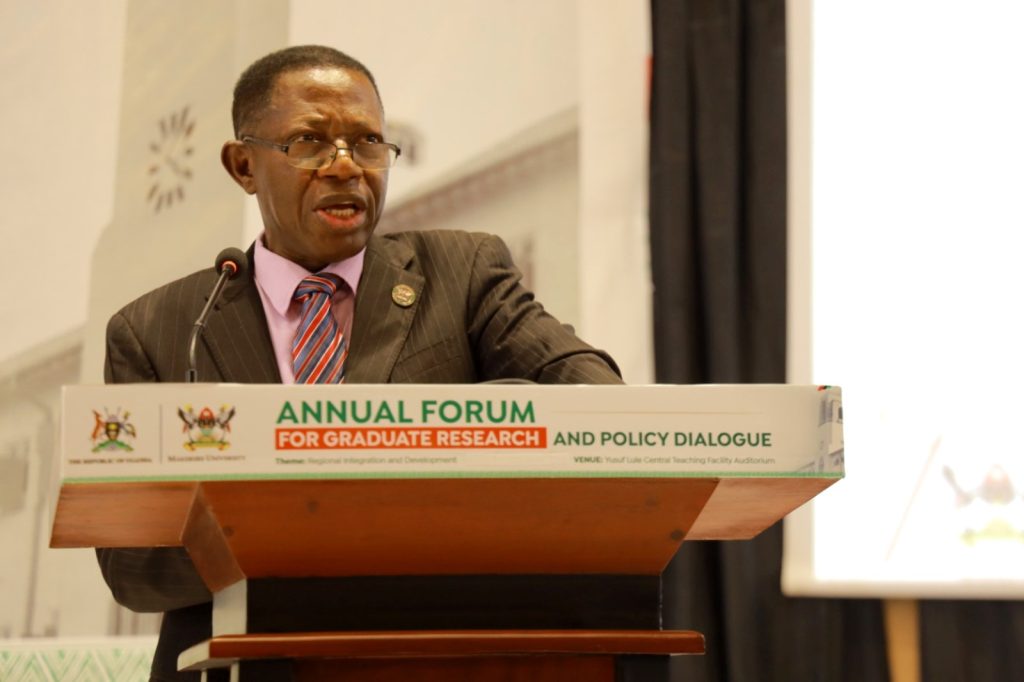
Prof. Buyinza further highlighted that the current drive by Ugandan Universities to transition into centres of excellence in graduate training will be facilitated by training of high-calibre staff and enabling the development of new PhD curricula. Makerere University in particular, he noted, is currently developing Taught PhD curricula in most disciplines as a way of tapping into crosscutting knowledge that empowers graduates to tackle today’s multifaceted challenges.
He nevertheless urged PhD fellows on the current curricula to embrace the philosophy of interconnectivity by attending research dissemination outside their disciplines and incorporating those insights that help their research address the bigger picture.
Prior to this, the Chairperson of the Annual Forum’s Organising Committee and Deputy Director DRGT, Prof. Julius Kikooma had painted a picture of what had transpired on day one. He started off by thanking Hon. Dr. John C. Muyingo for presiding over the opening ceremony, where he launched the Research Information Management System (RIMS) as well as the Vice Chancellor for delivering an impromptu keynote address, which demonstrated his passion for research and the power that it’s commercialisation holds for driving industrialisation that can propel Uganda’s and Africa’s development aspirations.
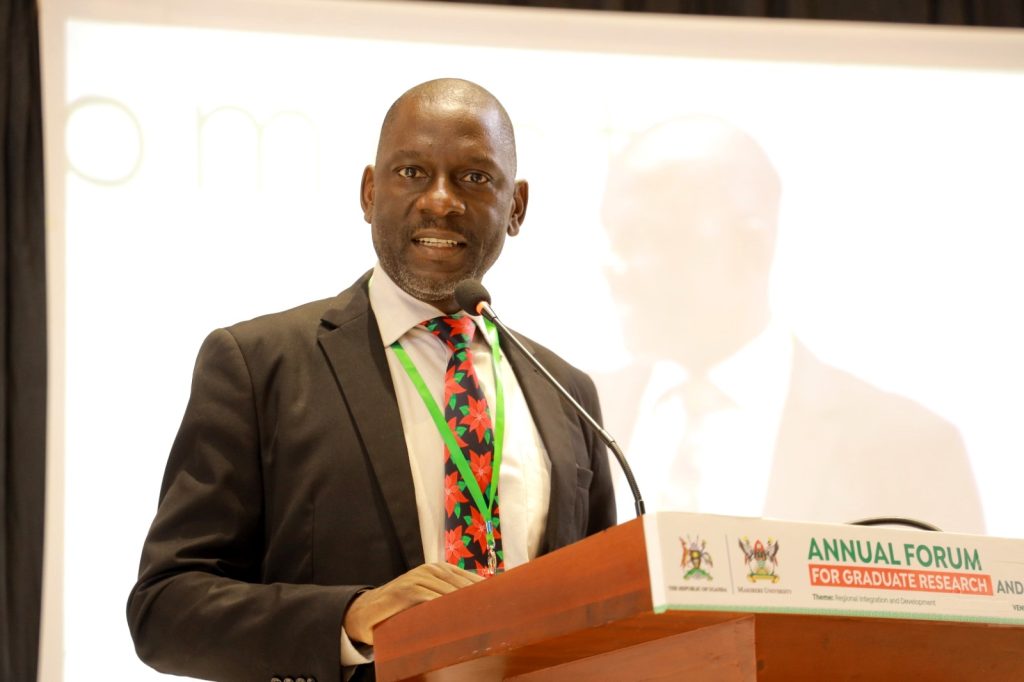
Prof. Kikooma further highlighted that papers presented on day one each highlighted the importance of research as an awareness raising tool that can foster implementation of innovations that impact various spheres of societal well-being. Researchers on Day one nevertheless admitted that a lot of their findings never make it to the implementation stage, hence the need for research uptake strategies.
“Noteworthy were calls for multidisciplinary research teams, which were reechoed as a catalyst for championing a broader understanding of the different issues that may impact development, and foster reception and implementation by policymakers at both local and international levels” continued Prof. Kikooma.
The papers he highlighted equally took note of; increasing minority groups and marginalised persons albeit no interventions in sight, the need to close the knowledge gap in different interventions across numerous development sectors, financing for capacity building and interventions so as to create meaningful and lasting impact of interventions, and the need for more bankable data to foster decision making and policy formulation in areas such as health, environment and energy.
Highlights by Prof. Kikooma further took note of; the resourcefulness of community engagement and collaboration in research undertakings as an essential step to foster uptake and use of research findings, as well as socio-cultural biases, attitudes and stereotypes and constraints in the form of resources and technologies that affect scaling up of research efforts.
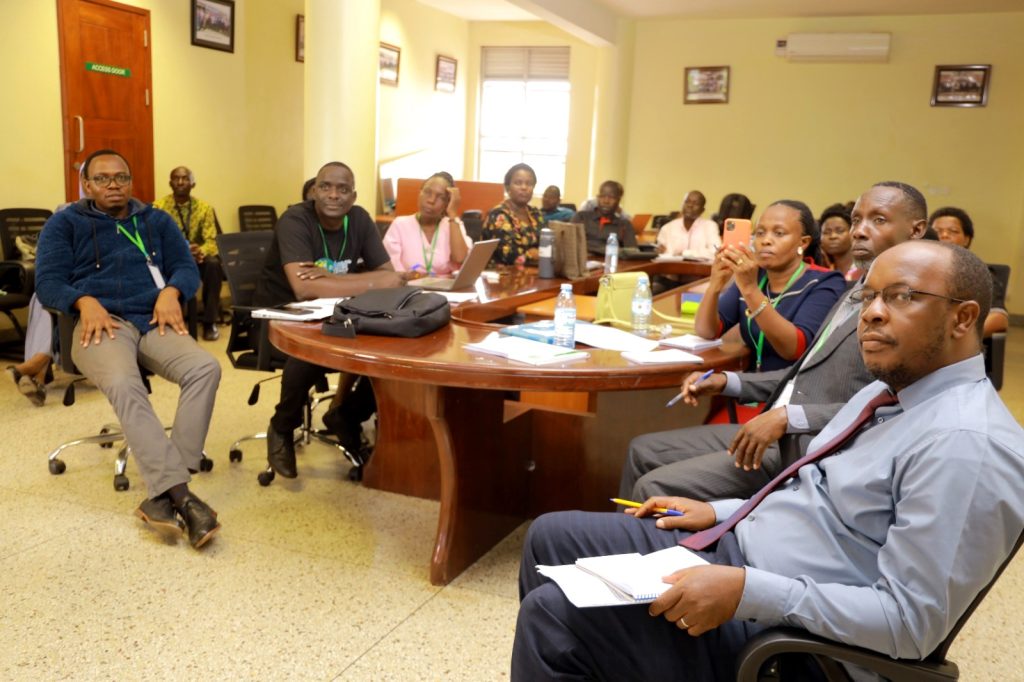
Prof. Kikooma equally took lead in the reflections on mental health and well-being for graduate students. He addressed the prevalence of mental health problems among graduate students and environmental factors that could actually be the source of these mental health challenges.
“It is crucial that we start more open conversations about mental health and well-being on campuses, to breakdown the stigma, to support students to build up their emotional resilience, and to enable more people to seek support from counseling and mental health services when things get tough” Prof. Kikooma proposed.
Graduate students as architects of knowledge production, pioneers of innovation, and catalysts of progress are an integral part of Makerere’s quest to become a research-led university. This position was reiterated by Prof. Edward Bbale’s remarks, wherein he further emphasized, “we count on you in terms of your dedication, your thirst for discovery, that must shape the future of our university and contribute to the socio-economic transformation of Uganda”.
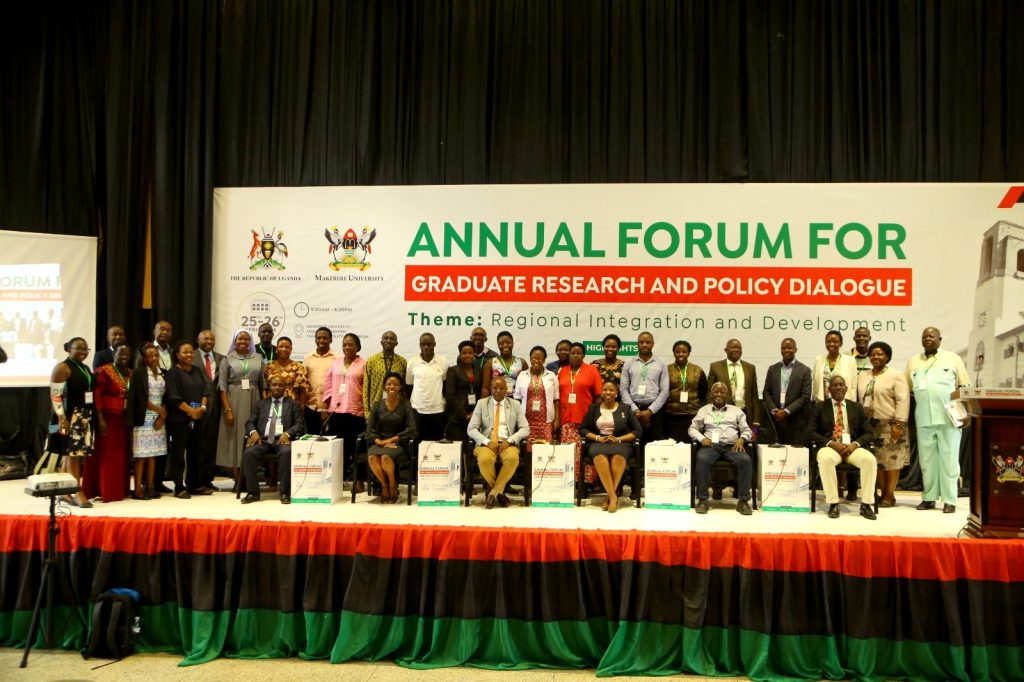
He called upon PhD candidates to interest themselves keenly in the policies that govern their environment such as the; Intellectual Property Management Policy, Research and Innovations Policy as well as the Intellectual Property Management Office as structures that have been put in place to ensure that their research is well-facilitated.
“Makerere University is very resolute to explore and walk the entire journey along the value chain from research and innovation to commercialisation. In line with this, the Makerere University Innovation Pod was established to package and market research outputs and innovations for impactful adoption within communities” explained Prof. Bbaale.
In addition to emphasis that the Innovation Pod is multidisciplinary and therefore open to innovations from all disciplines, he equally reemphasied the need for staff and students to use the Makerere University Press (Mak Press) to publish their work. Mak Press, Prof. Bbaale noted, is well recognised across the globe and works published therein will receive wide consumption and appreciation.
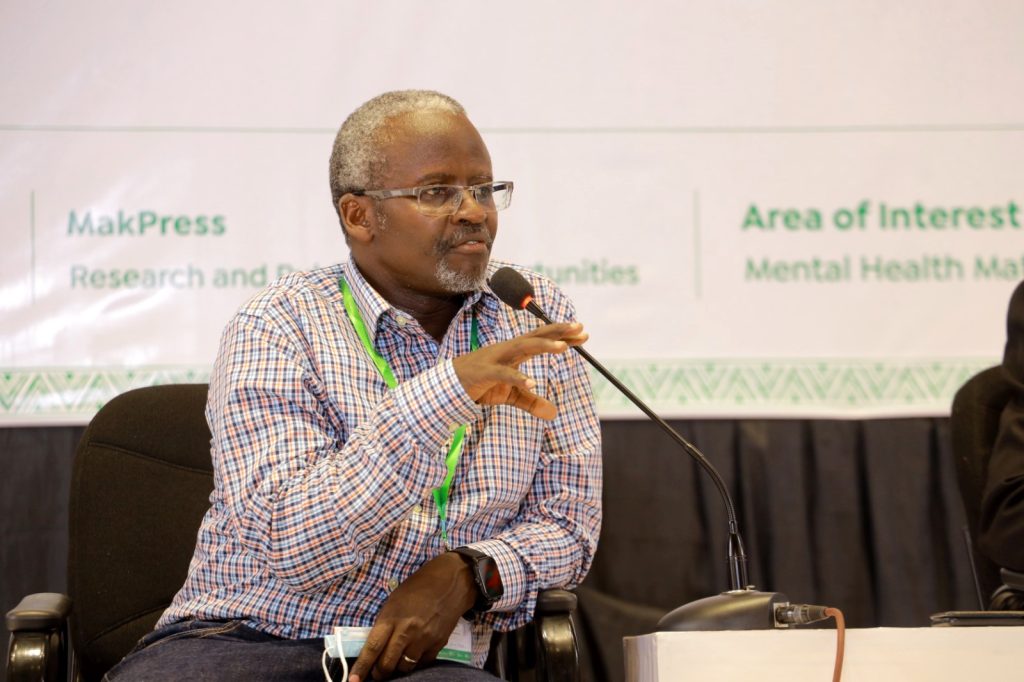
Addressing the audience, the Managing Editor Mak Press, Dr. William Tayeebwa clarified that all scholars at Makerere University have the privilege of having their works published free of charge by his unit, and better still, are eligible to receive 20% of the proceeds from the sales of their publications. To practically illustrate the opportunity at hand, Dr. Tayeebwa admitted that paper presentations from the two-day forum were good candidates for compilation into a book that can be published by Mak Press.
He revealed that talks with College Principals had addressed the need to support Graduate Students to publish their work in college-based journals. “The commitment we want to make as Makerere University Press under the Directorate of Research and Graduate Training is to continue this conversation with College Principals, especially to have special issues dedicated to PhD student work.”
The President PhD Fellows at Makerere University (Pf@Mak), Ms. Clare Cheromoi not only thanked Mak Press, DRGT and the University Management for putting in place a supportive environment for the students to thrive but like the proverbial Oliver Twist, also asked for more. She called upon PhD candidates to not only consider university-wide events such as the Annual Forum as a marketplace for their powerful ideas but also an avenue to build lasting relationships.
“I thank you and welcome you all to our training on policy briefs that will be held on Wednesday 1st May 2024,” added the President to the PhD community.
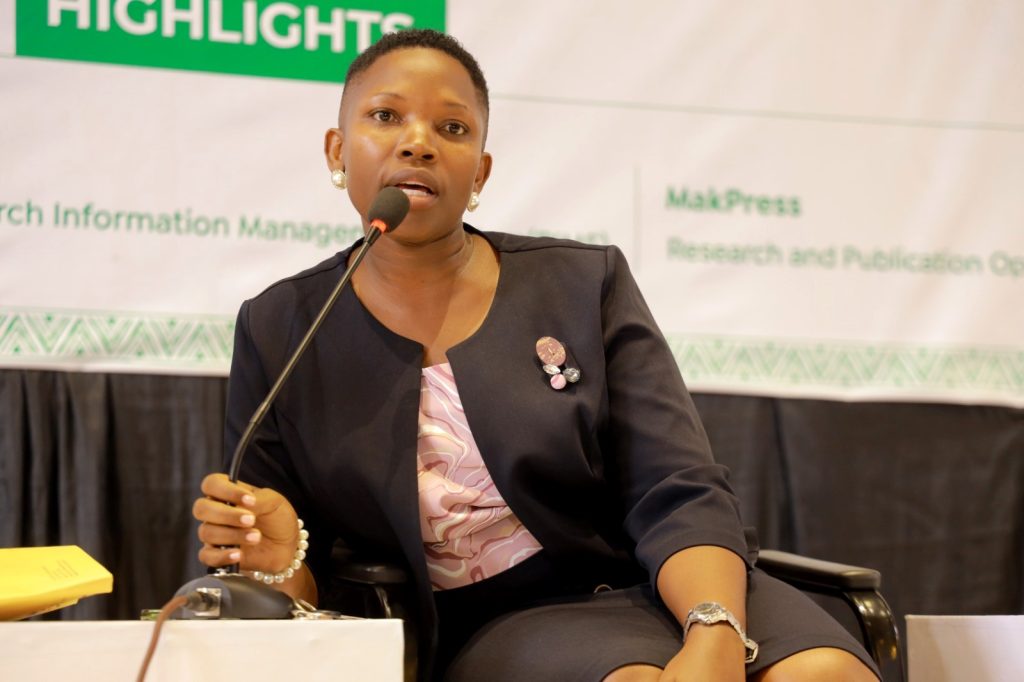
Prof. Bbaale concluded the day’s remarks by inviting the President and Executive Committee of Pf@Mak to consider making the Annual Forum a Bi-annual event so as to grant even more PhD candidates the opportunity to present their work.
“As the Directorate, we are committed to enhancing such meetings and interactions and we are very grateful that the University Central Management and Vice Chancellor is very passionate, and we received their utmost support financially and otherwise” he added.
Prof. Bbaale paid tribute to his predecessor and Principal Investigator RIMS, Prof. Buyinza Mukadasi for ensuring that his idea saw the light of day. He reassured PhD candidates that they would receive priority in the implementation of RIMS, so as to make their journey even smoother.
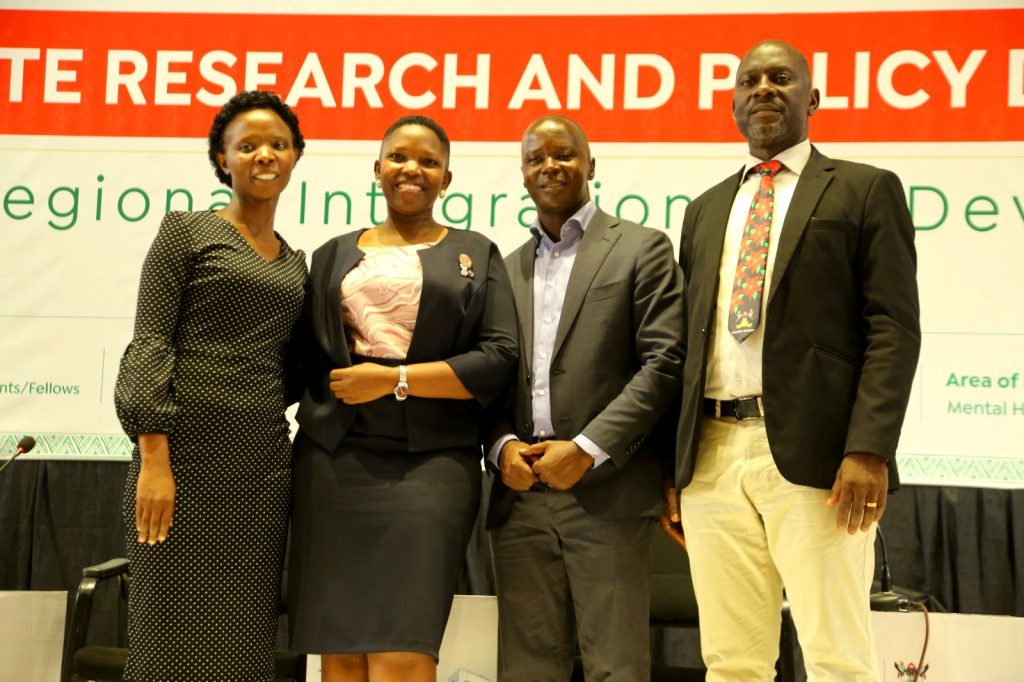
He thanked the Annual Forum and Policy Dialogue’s Organising Committee led by Prof. Julius Kikooma for a job well done in organising the inaugural event, and tasked them to aim higher so as to make future events bigger. He singled out the contribution of the Forum’s moderator, the Principal Public Relations Officer, Ms. Ritah Namisango for seamlessly steering the event, and the Media and ICT Teams for ensuring that the research findings shared at the Forum made their way to virtual audiences both in real-time and subsequent news broadcasts.
You may like
-


Over 9,200 to graduate at Makerere University’s 76th Graduation
-


76th Graduation Highlights
-


Mak Selected to Host Alliance for African Partnership Africa Office
-


Meet Najjuka Whitney, The Girl Who Missed Law and Found Her Voice
-


Makerere University School of Public Health Graduates First Cohort of Cost-Effectiveness Analysis Short Course
-


Climate variability found to shape malaria trends in Yumbe District
General
Over 9,200 to graduate at Makerere University’s 76th Graduation
Published
4 hours agoon
February 24, 2026
Pomp and colour defined the opening day of the Makerere University’s 76th Graduation Ceremony as thousands gathered to celebrate academic excellence and new beginnings.
The historic ceremony has brought together scholars, families, friends and industry partners in a vibrant celebration of achievement and possibility. Throughout the four-day event, the University will confer degrees and award diplomas to 9,295 graduands in recognition of their dedication and hard work.
Among the graduates, 213 will receive Doctor of Philosophy (PhD) degrees, 2,503 will graduate with Master’s degrees, and 6,343 will earn Bachelor’s degrees. In addition, 206 students will graduate with postgraduate diplomas, while 30 will be awarded undergraduate diplomas.
Of the total number of graduands, 4,262 are female and 5,033 are male. According to Vice Chancellor, this marks the first time in 15 years that male graduands have outnumbered their female counterparts.
The best overall graduand in the Sciences, Esther Ziribaggwa, graduated on the opening day with the Bachelor of Agricultural and Rural Innovation and an impressive Cumulative Grade Point Average (CGPA) of 4.77.

The ceremony marks a proud moment for Makerere University as it continues to nurture top-tier professionals across diverse fields.
While presiding over the graduation, the State Minister for Primary Education, Hon. Dr. Joyce Moriku Kaducu, on behalf of the First Lady and Minister of Education and Sports, Hon. Janet Kataaha Museveni, pointed out that Makerere University is a model institution, where leaders are nurtured, scholars are sharpened, and where dreams have been given direction.
In her address, Hon. Museveni, highlighted Government’s deliberate investment in research, innovation, and infrastructure to strengthen higher education in Uganda.
“The establishment of the Makerere University Research and Innovation Fund (RIF), supports high-impact research and innovation that directly contributes to national priorities and development. Through this initiative, thousands of researchers and innovators have pursued practical, scalable solutions that are transforming communities and key sectors across Uganda,” Mrs Museveni, said.
The Minister also noted that Parliament’s approved a USD 162 million concessional loan to upgrade science, technology, and innovation infrastructure at Makerere University. The funding will facilitate the construction of modern laboratories, smart classrooms, and state-of-the-art facilities for Engineering and Health Sciences, investments expected to position the University firmly within the Fourth Industrial Revolution.
“Government has embarked on the construction of a National Stadium at Makerere University and other institutions of higher learning across the country. This will promote physical education, strengthen talent identification, and boost investment in the sports sector,”

Turning to the graduands, the Minister encouraged them to see themselves not merely as job seekers, but as job creators and solution-makers.
Uganda and Africa need innovators who will modernize agriculture; engineers who will build quality infrastructure; healthcare professionals who will strengthen health systems; and educators who will inspire the next generation,” the Honourable Minister said.
She reminded graduates that they are entering a rapidly changing world shaped by Artificial Intelligence, climate change, and shifting global markets. To thrive, she advised them to remain adaptable, creative, and committed to lifelong learning.
She also encouraged graduates interested in entrepreneurship to tap into the Government’s Parish Development Model, which provides community-based financing and production support.
Quoting Proverbs 3:5–6, the Minister urged the graduates to trust in God as they embark on their next chapter.
She extended special appreciation to the Mastercard Foundation for its 13-year partnership with Makerere University in expanding access to education and empowering young people in Uganda and beyond.
In his speech, the Chancellor of Makerere University, Dr Crispus Kiyonga, urged graduands to harness research, innovation and technology to drive Uganda’s transformation.

“This is a milestone in your lives. You have invested time, discipline and hard work to attain these qualifications. It is important that you derive value from this achievement, not only for yourselves, but for your families and for society.” Dr Kiyonga, said.
Dr. Kiyonga expressed gratitude to the Government of Uganda for its continued financial support to the University, particularly the funding allocated under MakRIF, which he described as critical in strengthening the institution’s research capacity.
“Research plays a very vital role in the development of any community. Makerere as the oldest University in the country is doing a significant amount of research, However, more work is required to mobilize additional resources to further strengthen research at the University.” Dr Kiyonga, noted.
Acknowledging the challenges of a competitive job market, Dr. Kiyonga encouraged graduates to think beyond traditional employment pathways.
“It is true that the job market may not absorb all of you immediately. But the knowledge you have acquired is empowering. You can create work for yourselves, individually or in teams.” Dr Kiyonga, said.
He advised the graduands to embrace discipline, integrity and adaptability in the workplace, and to take advantage of technology and digital platforms to innovate and respond to societal challenges.
“Every development challenge presents an opportunity. Believe that you can apply your knowledge to create solutions with impact.” He said.
Addressing the congregation, the Vice Chancellor, Prof Barnabas Nawangwe, congratulated the graduands, particularly staff and societal leaders on their respective achievements.

“I congratulate all our graduands upon reaching this milestone. In a special way I congratulate the members of staff, Ministers, and Members of Parliament that are graduating today as well as children and spouses of members of staff,” Prof Nawangwe, said.
In his speech, Prof Nawangwe, recognized outstanding PhD students, particularly members of staff. who completed their PhDs in record time without even taking leave from their duties.
He called upon graduates not to despise humble beginnings but rather reflect on the immense opportunities around them and rise to the occasion as entrepreneurs.
“You are all graduating with disciplines that are needed by society. We have equipped you with the knowledge and skills that will make you employable or create your own businesses and employ others. Do not despair if you cannot find employment. Instead, reflect on the immense opportunities around you and rise to the occasion as an entrepreneur,” Prof Nawangwe, said.
Prof Nawangwe called upon the graduands of PhDs to use their degrees to transform the African continent.
“As you leave the gates of Makerere I urge you to put to good use the knowledge you have received from one of the best universities in the World to improve yourselves, your families, your communities, your Country and humanity. Let people see you and know that you are a Makerere alumnus because of the way you carry yourself in society with dignity and integrity. Put your trust in God and honour your parents and opportunities will be opened for you,” Prof Nawangwe, said.
Delivering a key note address, Prof. Nicholas Ozor, the Executive Director of the African Technology Policy Studies Network Nairobi, Kenya ((ATPS). Reminded the graduates that a degree is not a finish line but the beginning of accountability. “The world is a complex, fast changing and deeply unequal. Degrees make you responsible for others not better than them,” Prof Ozor, said.

The 76th Graduation Ceremony of Makerere University will be held from Tuesday 24th to Friday 27th February, 2026. A total of 213 PhDs (87 female, 126 male), 2,503 Masters (1,087 female, 1,416 male), 206 Postgraduate Diplomas (80 female, 126 male), 6,343 Undergraduate Degrees (2,999 female, 3,344 male), and 30 Undergraduate Diplomas (9 female, 21 male) will be graduating from all the Colleges.
Ms. Sarah Aloyo and Ms. Nakato Dorothy both students of the Bachelor of Procurement and Supply Chain Management emerged as the best in the Humanities and Best Overall students with a CGPA of 4.93. Mr. Ssewalu Abdul, a Bachelor of Leisure and Hospitality Management student emerged second best in the Humanities with a CGPA 4.90. Ms. Esther Ziribaggwa emerged as the best student in the Sciences with a CGPA of 4.77 in the Bachelor of Agricultural and Rural Innovation, while Mr. Simon Mungudit emerged second best in the Sciences with a CGPA of 4.76 in the Bachelor of Science in Petroleum Geoscience and Production.
Commencement Speakers
- Day 1 – Prof. Nicholas Ozor, the Executive Director of the African Technology Policy Studies Network, Nairobi, Kenya
- Day 2 – Prof. Dr. Maggie Kigozi, Chairperson Makerere University Endowment Fund Board
- Day 3 – Dr. Patricia Adongo Ojangole, Managing Director, Uganda Development Bank Limited
- Day 4 – Ms. Reeta Roy, Former President & Chief Executive Officer, Mastercard Foundation
The 76th Graduation Ceremony will be held at the Freedom Square following the schedule below:
Tuesday, 24th February, 2026
College of Agricultural and Environmental Sciences (CAES)
College of Computing and Information Sciences (CoCIS)
College of Education and External Studies (CEES)
School of Law (SoL)
Livestream Link for Day 1: https://youtube.com/live/wVGPA0FJ9pU
Wednesday, 25th February, 2026
College of Health Sciences (CHS)
College of Natural Sciences (CoNAS)
College of Veterinary Medicine, Animal Resources and Bio-security (CoVAB)
School of Public Health (SPH)
Thursday, 26th February, 2026
Makerere University Business School (MUBS)
College of Business and Management Sciences (CoBAMS)
Friday, 27th February, 2026
College of Engineering, Design, Art and Technology (CEDAT)
College of Humanities and Social Sciences (CHUSS)
Institute of Gender and Development Studies (IGDS)
Makerere Institute of Social Research (MISR)
General
Mak Selected to Host Alliance for African Partnership Africa Office
Published
1 day agoon
February 23, 2026
Makerere University has been selected to host the Africa Office of the Alliance for African Partnership (AAP). The significant milestone that underscores Makerere’s role in fostering research, innovation, and global collaborations across the continent was announced at a meeting of the University’s Central Management with an AAP delegation on 23rd February 2026.
Makerere’s selection was based on the University’s robust commitment, alignment with the AAP’s Strategic Plan, and proven ability to manage consortium activities. The AAP, which was initiated by Michigan State University (MSU) in collaboration with Ten African Universities and agricultural policy research networks in 2016, targets critical challenges in education, youth empowerment, health and nutrition, agri-food systems, science and technology, water, energy, environment, and culture and society.
Addressing the delegation consisting of AAP Co-Directors from MSU, Dr. Jose Jackson-Malete and Dr. Amy Jamison, accompanied by newly-appointed Director of the AAP Africa Office, Dr. Racheal Ddungu Mugabi and Ms. Clare Cheromoi, the Vice Chancellor, Prof. Barnabas Nawangwe who appreciated the choice of Makerere to host the Africa Office said:
“One of the greatest challenges facing African universities is PhD training, particularly supervisory capacity. Through partnerships such as the Alliance for African Partnership we can leverage international expertise to strengthen supervision—whether through training supervisors or through joint supervision arrangements.”
Prof. Nawangwe equally applauded joint initiatives such as the Grant Writing and Publication project, which gave rise to the establishment of a Writing Centre that he said can be used to build capacity in AAP member universities with Makerere as the hub. Officially launched on 21st March 2023, the project is living up to its expectation of becoming a springboard for strong postdoctoral collaborative research for both institutions and other US universities.
Dr. Titus Awokuse, Vice Provost and Dean for International Studies and Programs at Michigan State University (MSU) who attended virtually, reiterated that Makerere’s selection reflects its long-standing commitment to advancing African higher education, research excellence, and meaningful global collaboration.
Reflecting on the origins of the Alliance for African Partnerships (AAP), Dr. Awokuse explained that nearly a decade ago, MSU initiated a transformative conversation in Atlanta centered on the question: How should we partner differently? From this dialogue emerged AAP—an Africa-centered consortium that now brings together 12 institutions across Africa and the United States.

He emphasized that AAP is grounded in equity, mutual benefit, shared leadership, and deep respect for African priorities and expertise. Since its founding, MSU has served as convener and key supporter, working with member institutions to strengthen research collaboration, promote faculty and student engagement, and address shared development priorities.
Dr. Awokuse underscored that AAP’s success is the result of collective vision and commitment, not the efforts of a single institution. He paid tribute to Lilongwe University of Agriculture and Natural Resources for hosting the Africa Office in its early years and acknowledged the foundational leadership of the inaugural Africa Office Director.
He described the launch of the Africa Office at Makerere University as a significant milestone that reinforces Africa-led leadership, strengthens regional collaboration, and enhances responsiveness to emerging opportunities. MSU, he affirmed, remains fully committed to AAP and to working closely with Makerere and all consortium partners to expand collaborative research, nurture the next generation of scholars, and advance Africa-led solutions to global challenges.
The newly-appointed AAP Africa Office Director, Dr. Racheal Ddungu Mugabi is a member of faculty in the Department of Development Studies, Institute of Gender and Development Studies. Her work on intersectional inequalities in Uganda and other Global South regions uniquely positions her to drive collaborative research and partnerships at the Africa Office.
Initially founded by ten African Universities and MSU, AAP now comprises eleven African members including; the African Network of Agricultural Policy Institutes (ANAPRI)-Zambia, Egerton University-Kenya, Lilongwe University of Agriculture and Natural Resources (LUANAR)-Malawi, Makerere University-Uganda, United States International University-Africa-Kenya, Universite Cheikh Anta Diop-Senegal, Universite Yambo Ouologuem de Bamako-Mali, University of Botswana-Botswana, University of Dar es Salaam-Tanzania, University of Nigeria, Nsukka-Nigeria, and the latest, University of Pretoria-South Africa.
These Universites collaborate under Focal Points to advance policy-relevant research and sustainable development. Makerere University’s Focal Point is Prof. Robert Wamala, Director of Research, Innovations and Partnerships (DRIP).
Addressing the University Management, Dr. Jackson-Malete outlined the African Futures Research Leadership Program, which nurtures early career scholars through mentorship and skill-building as one of AAP’s flagship programs. She noted that the Program that prioritizes female participants or men committed to promoting women in higher education has for the first time during its fifth cohort admitted the first male, Dr. Alfadaniels Mabingo from the Department of Performing Arts and Film, Makerere University.
The AAP Africa Office at Makerere will coordinate activities, boost research collaboration, mobilize resources, and enhance global engagements for socio-economic transformation. This aligns with Makerere‘s broader goals of leveraging international expertise to build resilient institutions.
View more photos from the event: https://flic.kr/s/aHBqjCLjoA
Trending
-

 Humanities & Social Sciences2 days ago
Humanities & Social Sciences2 days agoMeet Najjuka Whitney, The Girl Who Missed Law and Found Her Voice
-

 Health6 days ago
Health6 days agoUganda has until 2030 to end Open Defecation as Ntaro’s PhD Examines Kabale’s Progress
-

 Agriculture & Environment5 days ago
Agriculture & Environment5 days agoUganda Martyrs Namugongo Students Turn Organic Waste into Soap in an Innovative School Project on Sustainable Waste Management
-

 General6 days ago
General6 days agoMastercard Foundation Scholars embrace and honour their rich cultural diversity
-

 Health2 weeks ago
Health2 weeks agoCall for Applications: Short Course in Molecular Diagnostics March 2026
